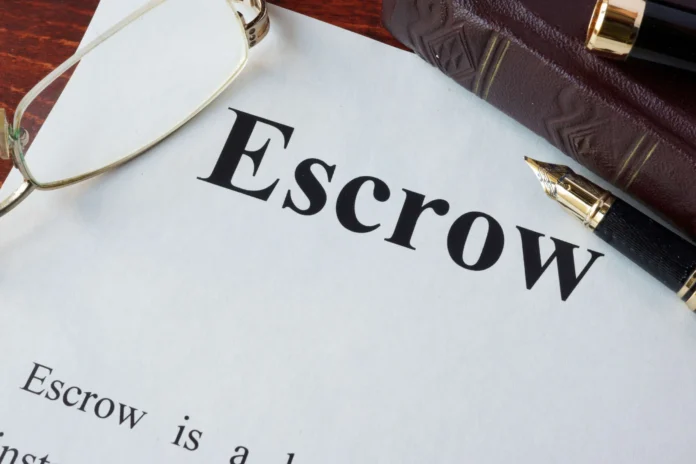Real estate transactions can come with a lot of stress and even confusion. After all, you need to learn and understand a lot of new information. The worst part of it all? Well, finances, of course!
Whether you’re buying or selling a home, a lot of money is on the line. So, you want to know exactly how big of a budget you need and what costs you’ll need to cover during this process. On the list of home selling/buying expenses is a little thing called escrow fees. But what are those?
How much will you be paying in escrow fees, are there other third-party fees, and will you be paying it all alone? Find the answers to all these questions below – keep reading.
What Is Escrow and How Does It Work?
Before digging into escrow fees, let’s explain what escrow actually is. Escrow is an arrangement in which a third party (the escrow agent) holds and disburses funds or property on behalf of two other parties (the buyer and seller) involved in a transaction. The purpose of escrow is to protect both buyers and sellers in a transaction by ensuring that all conditions of the sale contract are met before any money or property changes hands.
In a real estate transaction, the escrow agent is typically a neutral third party, such as a title company or an attorney. The buyer and seller each deposit money into the escrow account, and the escrow agent holds onto the funds until all conditions of the sale are fulfilled. Once all conditions are met, the escrow agent disburses the funds to the appropriate parties.
What Are Escrow Fees?
Now that you know the basics of escrow, we can move on to escrow fees. Simply put, escrow fees are the fees charged by the escrow company for their services. These fees typically range from 1-2% of the total purchase price, but they can vary depending on the type of transaction and the location.
Factors that Determine Escrow Fees
Escrow fees aren’t fixed, meaning they vary depending on a few different factors. To figure out if you’ll be paying more or less in fees, these are the factors you should be aware of:
- The type of transaction (real estate, online purchase, etc.)
- The location of the transaction
- The amount of money held in escrow
- The length of time that the funds are in escrow
- The services the escrow agent provides (e.g., disbursing funds, preparing documents, etc.)
Calculating Escrow Fees
Now let’s take a closer look at how escrow fees are actually calculated. As we mentioned, escrow fees are typically a percentage of the total purchase price. However, the percentage can vary depending on the type of transaction and the location.
For example, in California, you usually pay $2 per $1,000 of the total price, plus $250. So, if you’re buying a home for $500,000, your escrow fee would be $2,250.
It’s important to note that the total escrow fee is generally split between the buyer and seller in a real estate transaction. So, in the example above, the buyer would be responsible for $1,125, and the seller would be responsible for $1,125.
In addition to the base rate, escrow companies may also charge additional fees for services like document preparation, wire transfers, and overnight delivery. These fees are typically passed on to the buyer and seller in the form of a service fee. For example, if the escrow company charges a $25 service fee for document preparation, the buyer would be responsible for $12.50, and the seller would be responsible for $12.50.
It’s important to note that not all escrow companies charge service fees. Some escrow companies include these fees in their base rate, while others absorb the cost themselves. To get an accurate estimate of your escrow fees, it’s best to contact your escrow company directly and ask for a fee estimate. This will help you plan your budget and choose the company that best works for you.
Who Pays Escrow Fees?
In most cases, both the buyer and the seller will split the cost of the escrow fees. However, there are some instances where only one party may be responsible for paying the fees. For example, in some real estate transactions in California, the seller is typically responsible for paying the escrow fees.
What Are Third-Party Costs?
Third-party costs are the fees charged by third parties for their services in a real estate transaction. These fees include an appraisal, inspection, loan origination fees, etc. Third-party costs are not typically included in escrow fees.
In most cases, third-party costs are paid by the buyer. However, in some instances, the seller may be responsible for paying certain third-party fees.
We should note that third-party costs are not the same as escrow fees. Escrow fees are charged by the escrow company for their services, while third-party costs are charged by other third parties.
Examples of Third-Party Costs
So, when buying a home, you can expect to pay a variety of additional third-party costs. These are some of the most common third-party fees:
- Appraisal Fee: An appraisal fee is charged by a certified appraiser for determining the value of the property.
- Inspection Fee: You’ll usually pay an inspection fee to a professional inspector who identifies any problems with the property.
- Loan Origination Fee: A loan origination fee is charged by a lender and is used to cover the cost of processing the loan.
- Lender Title Insurance: Lender title insurance protects the lender from any problems with the property title.
- Tax Service Fee: A tax service fee is charged by a company providing tax information to the mortgage lender.
- Mortgage Insurance: Mortgage insurance protects the lender from any problems with the loan.
Final Thoughts
All these costs might seem like a lot, but they are essential for a successful and safe real estate transaction. But at least you now know how much you can expect to pay to your escrow agent. We always recommend talking to your escrow company in advance and hearing how much they charge for their services. This will give you even more clarity.
And remember, you’re not only paying fees – you’re also paying for the peace of mind that comes with knowing your money is being held safely and securely.



















